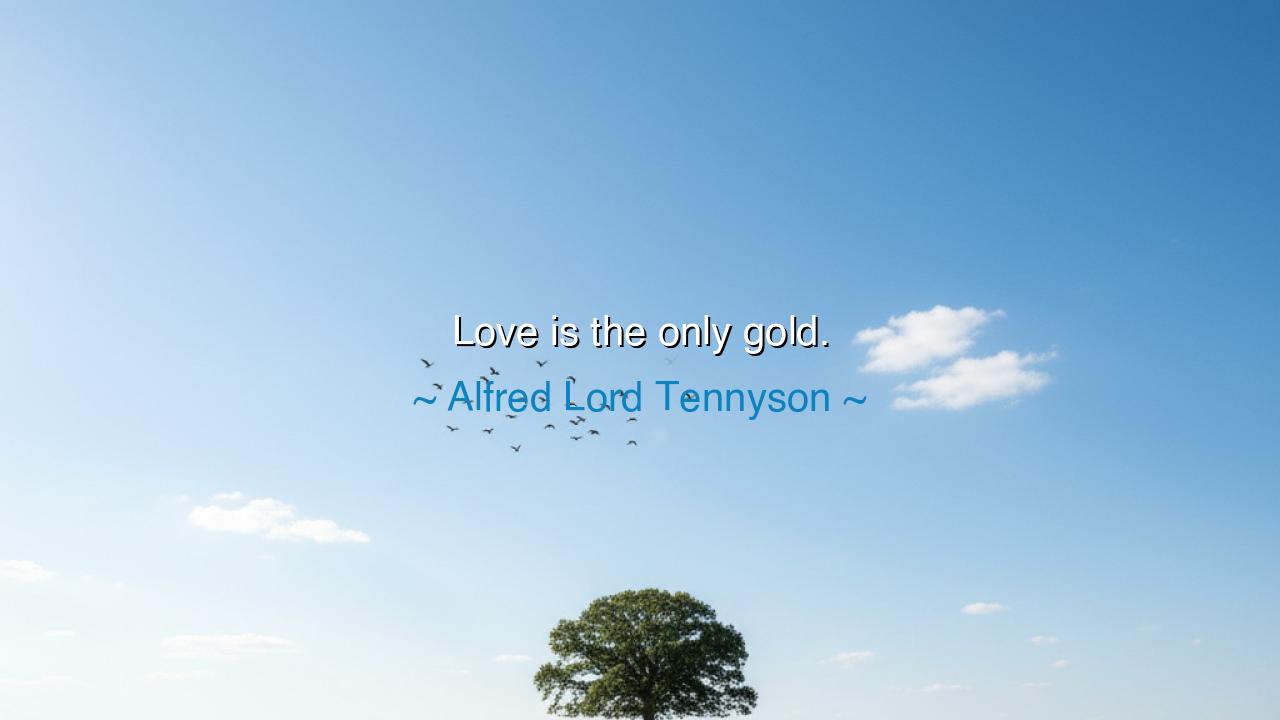
Love is the only gold.






“Love is the only gold.” – Alfred, Lord Tennyson
Thus spoke Alfred, Lord Tennyson, poet of light and sorrow, who sought the divine in both beauty and pain. In this brief but radiant truth, he declares that among all the treasures the world pursues — wealth, power, fame — love alone holds the true and imperishable value. Gold, the symbol of earthly worth, may glitter and fade; empires rise and crumble; fame shines for a moment, then disappears into dust. But love — love endures. It is the one possession that cannot be stolen, the one currency that grows richer the more it is given. Love is the only gold, for it is the wealth of the soul.
Tennyson’s words come from a lifetime shaped by loss and longing. He was a man who knew grief deeply, mourning his dearest friend Arthur Hallam, whose death inspired his masterpiece In Memoriam. Through his poetry, Tennyson wrestled with mortality, faith, and meaning — and in the end, he found his answer not in intellect, nor ambition, but in love. To him, love was divine alchemy — the force that turned the base metal of human suffering into the shining gold of spiritual truth. The poet had seen that only love could bridge the chasm between life and death, between despair and hope.
When Tennyson calls love “gold,” he speaks not of romantic pleasure alone, but of universal love — the love that binds families, friends, and strangers; the love that holds the world together. It is that quiet strength that endures when everything else is stripped away. To the eyes of the materialist, gold is found in coins; to the eyes of the sage, gold is found in compassion. For love enriches the giver as much as the receiver. A man with a heart full of love is wealthier than a king surrounded by jewels.
Consider the life of Mahatma Gandhi, who lived without riches, without throne, without armies — yet commanded the hearts of millions. What power did he wield? Not violence, not fear, but love — the golden force of truth and mercy. When his enemies struck him, he forgave. When the world doubted him, he remained steadfast. His wealth was invisible but immeasurable, for it lay in the trust and devotion of those he served. Gandhi’s life was living proof of Tennyson’s vision: that love, not gold, builds empires of the spirit.
The ancients too knew this truth. The sages of every age spoke of love as the element divine — the philosopher’s stone that transforms the soul. The Apostle Paul said, “Though I speak with the tongues of men and of angels, and have not love, I am nothing.” The Buddha taught that compassion is the greatest treasure one can store. And in the East, the poets of Persia wrote that “love turns dust to light.” Tennyson, heir to this eternal wisdom, simply gave it a modern voice: “Love is the only gold.” The wealth of the heart is the only wealth that outlasts time.
Yet, in our restless age, many still chase false gold — the glitter of possessions, the pride of achievement, the applause of men. They grasp and gather, only to find their hands empty in the end. For without love, success turns hollow; without compassion, power becomes poison. The richest life is the one rich in affection, kindness, and mercy. Love is the gold that neither rusts nor rots, the treasure buried not in the earth but in the soul.
So, my listener, remember this teaching: seek not what shines, but what warms. Measure your wealth not by what you hold, but by whom you hold dear. Let your actions be guided by love — for love will make your labor noble, your failures meaningful, and your victories eternal. Be slow to anger, quick to forgive, generous in heart. For when the final day comes and the world’s gold turns to dust, only love will remain, gleaming in the ashes — the purest treasure, the only gold worthy of heaven and earth.






AAdministratorAdministrator
Welcome, honored guests. Please leave a comment, we will respond soon